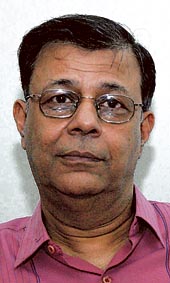 |
| Rabijita Gogoi, an NSD alumnus, has chosen theatre as a medium to express her concern for society. Picture by Biju Boro |
Rabijita Gogoi
A costume designer in John Rashal Brown’s stage play Macbeth. A technician in the Japanese production Miwa. Director of the first ever Nagamese play Nisheli.
Rabijita Gogoi, an alumnus of the National School of Drama (NSD), has shown tremendous knack for experimental theatre. At present, plaudits are flowing into her kitty after she staged her latest play Gaatha — the 1st text — in March, during the Bharat Rang Mahotsav, an annual theatre fiesta of the National School of Drama. Her work was also selected for the Ahmedabad Theatre Festival this month.
“It’s an honour to be a part of the monthlong festival of NSD and that, too, among a motley group of some 73 national and eight international drama troupes,” says Rabijita.
She has come a long way from the hill tracts of Diphu where she was born on August 7, 1972. “Our’s is a family of teachers and I was also supposed to take up the family profession,” she says. But fate had something different to offer her. Her stay in Guwahati to complete her graduation gave a new dimension to her life.
Her first dive into the world of theatre was in 1991 when she performed in a play titled Guwahati-Guwahati under the guidance of veteran director Baharul Islam. “During the performance of the play in and around Guwahati, seeing the kind of response of the audience I went through a sea change in my attitude towards theatre as a medium of performance,” recalls Rabijita. “Then I decided to learn the art of theatre in a professional manner and bagged a seat in the department of design and direction in the NSD.
“The NSD is a germinating ground for all talents. Here I got to learn about all the nuances of theatre,” she says. “Thus a formal training in theatre helps you to get rid of certain prejudices that are still prevalent regarding this medium,” says Rabijita.
While still a student at NSD, Rabijita formed her own theatre group, Jirsong, with a few theatre lovers of Karbi Anglong. “My basic idea behind coming up with Jirsong is to share my experiences in the NSD with the local people who are forced to alienate themselves from their traditional culture,” she adds.
For last 10 years Jirsong has been working towards preservation of the folk culture of the Northeast which has got subdued in the ethnic conflicts among the tribals.
Thus immediately after finishing her course from the NSD, Rabijita was called by the NSD group to join in it. Her first directorial venture was Dhruvaswamini, a play by the renowned Hindi playwright Jai Shankar Prasad. Her very first attempt was wholeheartedly welcomed by the critics.
Her very first endeavour showed her maturity as a director to deal with a play that talks about the right of woman to choose. “Although a historical play, Dhruvaswamini is very contemporary. I would say, it is rather an ageless play and the audiences quickly related to the very concept of the drama,” says Rabijita.
Till 2000 she remained in Delhi where she worked in different plays as director, costume designer and set and light designer. “Working with people like John Rashal Brown and B.V. Karanth in Delhi helped me absorb a whole lot of experiences, experiences that infused in me a sense to experiment with traditional style of working in theatres,” muses Rabijita. She has attempted different styles and forms in her theatrical productions.
From Harold Pinter’s play The Dumb Waiter to the Karbi play Ranpharpirangbe based on a rebellious Karbi woman, Rabijita has matured as an artiste with every venture. Her oeuvre consists of more than 15 plays. For the last four years, she had made Guwahati her base.
“I came back from Delhi to work with our people, to promote their culture and to tap their potential in a medium, which is not so popular and less known,” she reflects. “I am no politician or bureaucrat, so as an ordinary person I took to theatre to express myself.” Rabijita is upset over the lack of awareness regarding drama as an art form. “I partly blame the government for the sorry state of affairs in the region,” she rues. “Hardly do we have any school that imparts training in dramatics, whereas states like Kerala are running theatre schools like Trichur School of Drama that provide lessons in all the departments of theatrical activities.
“We, in Assam, are only aware of mobile theatre. My kind of work is looked at as amateur creation,” she says. “It is not that people are not interested in serious play but we first need to reach out to them and for that we need talent as well as infrastructure,” she explains. She also came up with suggestions and asked the colleges and schools to come up with theatre camps at least during the vacations. “Our theatre group, Jirsong, is also trying to come up with magazines and literature to spread awareness regarding the kind of work going on in the national and international arena,” she adds.
“Although a theatre movement like the Indian Progressive Theatre Association (IPTA) finds it hard to gain momentum here, at least we can train a bunch of theatre talents in our region too,” she says.
Rabijita has kept alive the richness of the folk culture of the region by working with various tribes, from Karbis to Nagas. Not only has she worked with them, but has also taken the tribal culture of the region to be showcased at various drama festivals of India.










